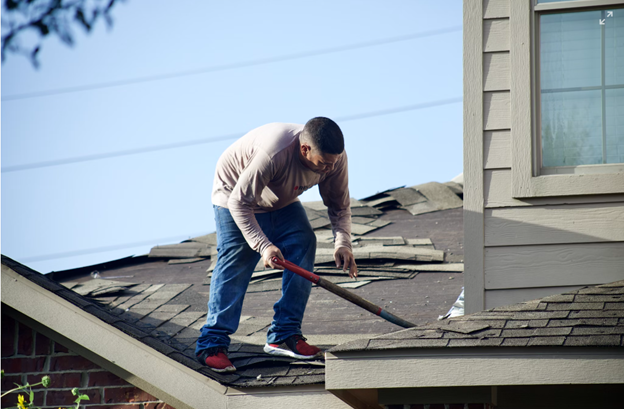A leaky roof can disrupt your peace of mind faster than a summer downpour. But before you call the nearest roofer, taking a proactive approach ensures you get the best possible repair for your home. Here’s a comprehensive guide to what you should consider before getting your roof repaired:
Identifying the Problem:
- Self-Inspection: Start with a visual inspection from the ground. Look for missing or damaged shingles, warped flashing around chimneys or vents, and any visible water stains on your roof’s surface or interior ceilings. These are telltale signs of potential problems.
- Professional Assessment: While a self-inspection can provide clues, a professional roofer can offer a more comprehensive assessment. They’ll inspect the roof itself, identify the source of the leak or damage, and recommend the most appropriate repair solution.
Understanding the Extent of the Damage:
Minor repairs like replacing a few shingles are a different beast compared to a widespread issue requiring significant underlayment or roof deck replacement. A roofer’s assessment will not only identify the source of the problem but also determine the extent of the damage, giving you a clearer picture of the scope and cost of the repairs.
Weighing Repair vs. Replacement:
In some cases, depending on the age and condition of your roof, repairs might not be the most cost-effective solution. A qualified roofer will advise you on whether a full roof replacement might be a better long-term investment. Factors to consider include the age of your roof, the extent of the damage, and the remaining lifespan of the existing roof materials.
Budgeting for Repairs:
Roof repairs can range in cost depending on the materials needed, the extent of the damage, and the labor involved.
- Get Multiple Estimates: Obtain estimates from several qualified roofers. This allows you to compare pricing and services offered by different companies.
- Consider All Costs: Go beyond the base repair cost and factor in potential permit fees, disposal costs for old materials, and any additional materials needed during the repair process.
Choosing the Right Roofer:
A qualified roofer is crucial for a successful repair. Here’s what to look for:
- Licensing and Insurance: Ensure the roofer has a valid license in your area and carries liability and worker’s compensation insurance. This protects you in case of accidents or property damage during the repairs.
- Experience and Reputation: Look for a roofer with a proven track record and experience working with your specific type of roof material.
- References and Reviews: Ask the roofer for references and check online reviews to gauge their customer satisfaction and quality of work.
Understanding the Repair Process:
A reputable roofer will walk you through the repair process step-by-step. This includes:
- Safety Measures: Inquire about the safety precautions the roofer takes to protect themselves and your property during the repairs.
- Timeline for Completion: Understand the estimated timeframe for the repairs to minimize disruption to your daily life.
- Debris Removal: Confirm how the roofer will handle debris removal after the repairs are complete.
Warranties and Guarantees:
Reputable roofers offer warranties on their workmanship and potentially the materials used. Understanding the terms of the warranty provides peace of mind knowing you’re covered if any issues arise after the repairs are completed.
Communication is Key:
Maintain clear communication with your chosen roofer throughout the repair process. Ask questions, voice any concerns, and ensure you understand the details of the work being done.
Permitting Requirements:
Depending on the extent of the repairs and your local building codes, a permit might be required. A qualified roofer can advise you on the permitting process and can potentially obtain the necessary permits on your behalf.
Weather Considerations:
While residential roof repair can be done year-round, it’s generally best to avoid extreme weather conditions like heavy rain, snow, or high winds. Scheduling repairs during favorable weather minimizes the risk of delays or complications.
By following these essential considerations, you can approach your roof repairs with confidence. Remember, a proactive approach ensures you get a high-quality repair that protects your home for years to come.





